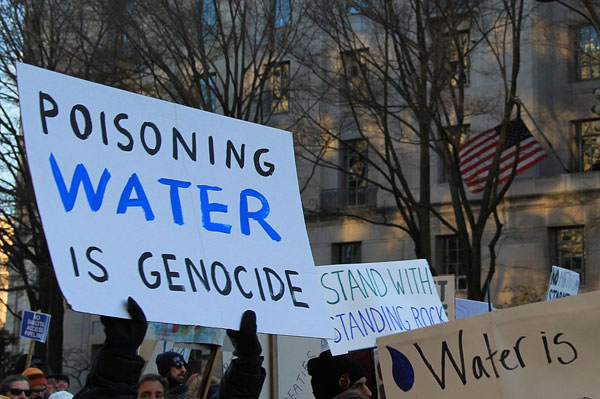
April 1, 2019; ACLU Blog
The South Dakota chapter of the American Civil Liberties Union (ACLU) has announced it is suing the state of South Dakota in federal court over three laws called the “Pipeline Package,” which the ACLU says violate the First and Fourteenth Amendments of the Constitution “by chilling protected speech and failing to adequately describe what speech or conduct could subject protesters and organizations to criminal and civil penalties.” A copy of the complaint filed in federal court is available here.
While no one has a good definition of what “riot boosting” is, South Dakota now has a law against it as a part of the Pipeline Package, which gives the state authority to sue individuals and organizations for doing it. Attorneys Andrew Malone and Vera Eidelman of the ACLU point out that the law is written very vaguely and broadly as to what constitutes riot boosting, casting a net wide enough to scoop up or at least threaten all activists exercising their free speech rights in connection with a protest in that state. Malone and Eidelman add that this could be something as simple as a tweet exhorting friends to get to a protest “and give it all you’ve got.”
Those found to be in violation of the law could be subject to some combination of up to 25 years of prison time, and fines, and civil penalties of up to $50,000. Malone and Eidelman write:
Let’s be very clear: States are within their rights to prohibit incitement of violence—a narrow category of unprotected speech that refers to words intended and likely to cause imminent violence. But these laws go far beyond that by criminalizing impassioned advocacy that lies at the core of our political discourse. They instill a fear among peaceful organizers that their actions or words could be misconstrued by the government as “riot boosting.” As a result, activists are now forced to think twice before even encouraging others to join a protest, let alone train, educate, or advise those who plan to protest. And, because of these laws, they may forgo such speech and association altogether.
That is a clear First Amendment violation—and why we are in court to challenge the laws on behalf of the Sierra Club, NDN Collective, Dakota Rural Action, and the Indigenous Environmental Network.
The Riot Boosting Act was developed in close conversation with TransCanada, which is set to build and operate the Keystone XL pipeline, and “other stakeholders”—a designation that did not include Native American or environmental groups—and it allows that company and other third parties to join the state in suing protestors.
Nick Tilsen, an Oglala Lakota Nation citizen and president of NDN Collective, says, “They’re basically criminalizing anybody who is standing up for their rights and putting their voice out there—and those who support us,”
Sign up for our free newsletters
Subscribe to NPQ's newsletters to have our top stories delivered directly to your inbox.
By signing up, you agree to our privacy policy and terms of use, and to receive messages from NPQ and our partners.
Putting a cherry on the top, any monies that results from the lawsuits can be used to fund the pipeline.
“I fully support the freedoms of speech and assembly, but we must also have clear expectations and the rule of law,” said [South Dakota Governor Kristi] Noem. “My pipeline bills make clear that we will not let rioters control our economic development. These bills support constitutional rights while also protecting our people, our counties, our environment, and our state. I’m proud of this proactive approach that will spread the risks associated with pipeline construction, and I’m glad to sign it into law today.”
Noem’s Pipeline Package outlines a two-pronged approach for pipeline construction. First, it creates the Pipeline Engagement Activity Coordination Expenses (PEACE) fund for the coordination of law enforcement expenditures. This includes a transparent process for fees and other funds to be collected through a variety of sources that will pay for the extraordinary costs incurred by the state and counties because of pipeline construction. Secondly, it creates an additional fund and legal remedies to pursue out-of-state money fueling riots that aim to shut down the pipeline build.
“I believe this approach could serve as the next generation model of major energy infrastructure development,” concluded Noem.
Malone and Eidelman see the law as a vaguely drawn next generation of suppression:
In just the last two years, we’ve seen a rise in government efforts to stifle protests, particularly those led by Indigenous and environmental activists, often in opposition to pipelines. There have been attempts to equate protesters with domestic terrorists and saboteurs. Law enforcement authorities have partnered with private security companies to surveil activists and control protests. Known FBI informants have infiltrated activist spaces and camps. The federal government has implemented “no-fly zones” to black out media coverage during heightened police crackdowns.
This particular so-called “riot-boosting” ban is taking place, of course, in South Dakota, far from the gaze of most media outlets. But, as NPQ has noted before, we live in a time when US democracy itself is at risk. A threat to one is, in fact, a threat to all. Also, the Dakotas are where one of our most critical climate change struggles is under way. If our sector fails to pay attention here, we do so at our own peril.—Ruth McCambridge











